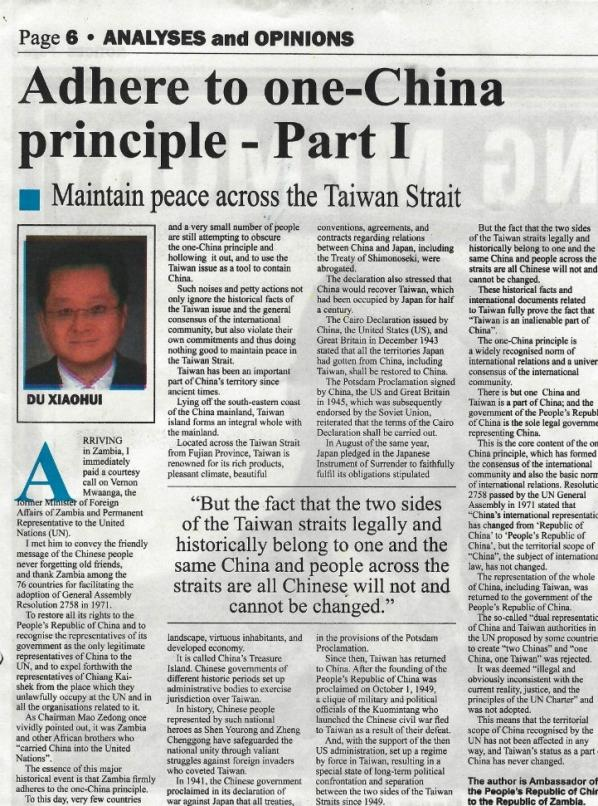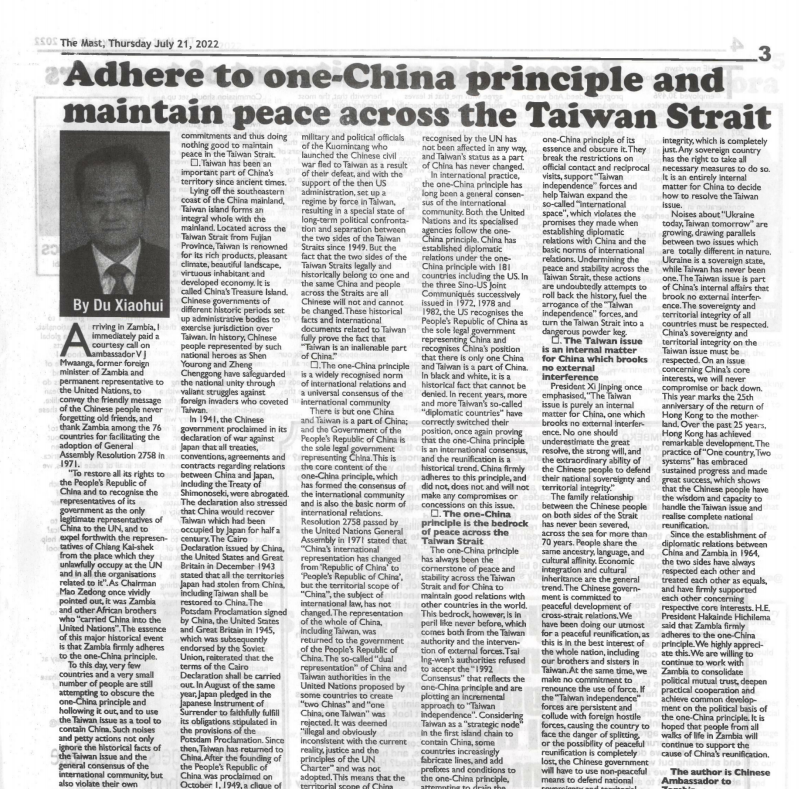Recently, H.E. Mr. Du Xiaohui, Chinese Ambassador to Zambia, published an article entitled “Adhere to One-China Principle and Maintain Peace across the Taiwan Strait" on local mainstream media such as Times of Zambia, Daily Mail and Mast. The full text is as follows:

Arriving in Zambia, I immediately paid a courtesy call on Amb. V.J. Mwaanga, former Foreign minister of Zambia and Permanent Representative to the United Nations, to convey the friendly message of the Chinese people never forgetting old friends, and thank Zambia among the 76 countries for facilitating the adoption of General Assembly Resolution 2758 in 1971. "To restore all its rights to the People's Republic of China and to recognize the representatives of its government as the only legitimate representatives of China to the UN, and to expel forthwith the representatives of Chiang Kai-shek from the place which they unlawfully occupy at the UN and in all the organizations related to it". As Chairman Mao Zedong once vividly pointed out, it was Zambia and other African brothers who "carried China into the United Nations". The essence of this major historical event is that Zambia firmly adheres to the one-China principle.
To this day, very few countries and a very small number of people are still attempting to obscure the one-China principle and hollowing it out, and to use the Taiwan issue as a tool to contain China. Such noises and petty actions not only ignore the historical facts of the Taiwan issue and the general consensus of the international community, but also violate their own commitments and thus doing nothing good to maintain peace in the Taiwan Strait.
Ⅰ. Taiwan has been an important part of China's territory since ancient times.
Lying off the southeastern coast of the China mainland, Taiwan island forms an integral whole with the mainland. Located across the Taiwan Strait from Fujian Province, Taiwan is renowned for its rich products, pleasant climate, beautiful landscape, virtuous inhabitant and developed economy. It is called China's Treasure Island. Chinese governments of different historic periods set up administrative bodies to exercise jurisdiction over Taiwan. In history, Chinese people represented by such national heroes as Shen Yourong and Zheng Chenggong have safeguarded the national unity through valiant struggles against foreign invaders who coveted Taiwan.
In 1941, the Chinese government proclaimed in its declaration of war against Japan that all treaties, conventions, agreements and contracts regarding relations between China and Japan, including the Treaty of Shimonoseki, were abrogated. The declaration also stressed that China would recover Taiwan which had been occupied by Japan for half a century. The Cairo Declaration issued by China, the United States and Great Britain in December 1943 stated that all the territories Japan had stolen from China, including Taiwan shall be restored to China. The Potsdam Proclamation signed by China, the United States and Great Britain in 1945, which was subsequently endorsed by the Soviet Union, reiterated that the terms of the Cairo Declaration shall be carried out. In August of the same year, Japan pledged in the Japanese Instrument of Surrender to faithfully fulfill its obligations stipulated in the provisions of the Potsdam Proclamation. Since then, Taiwan has returned to China. After the founding of the People's Republic of China was proclaimed on October 1, 1949, a clique of military and political officials of the Kuomintang who launched the Chinese civil war fled to Taiwan as a result of their defeat, and with the support of the then US administration, set up a regime by force in Taiwan, resulting in a special state of long-term political confrontation and separation between the two sides of the Taiwan Straits since 1949. But the fact that the two sides of the Taiwan Straits legally and historically belong to one and the same China and people across the Straits are all Chinese will not and cannot be changed. These historical facts and international documents related to Taiwan fully prove the fact that "Taiwan is an inalienable part of China."
Ⅱ. The one-China principle is a widely recognized norm of international relations and a universal consensus of the international community.
There is but one China and Taiwan is a part of China; and the Government of the People's Republic of China is the sole legal government representing China. This is the core content of the one-China principle, which has formed the consensus of the international community and is also the basic norm of international relations. Resolution 2758 passed by the United Nations General Assembly in 1971 stated that "China's international representation has changed from 'Republic of China' to 'People's Republic of China', but the territorial scope of "China", the subject of International Law, has not changed. The representation of the whole of China, including Taiwan, was returned to the government of the People's Republic of China. The so-called "dual representation" of China and Taiwan authorities in the United Nations proposed by some countries to create "two Chinas" and "one China, one Taiwan" was rejected. It was deemed "illegal and obviously inconsistent with the current reality, justice and the principles of the UN Charter" and was not adopted. This means that the territorial scope of China recognized by the UN has not been affected in any way, and Taiwan's status as a part of China has never changed.
In international practice, the one-China principle has long been a general consensus of the international community. Both the United Nations and its specialized agencies follow the one-China principle. China has established diplomatic relations under the one-China principle with 181 countries including the US. In the three Sino-US Joint Communiqués successively issued In 1972, 1978 and 1982, the US recognizes the People's Republic of China as the sole legal government representing China and recognizes China's position that there is only one China and Taiwan is a part of China. In black and white, it is a historical fact that cannot be denied. In recent years, more and more Taiwan's so-called "diplomatic countries" have correctly switched their position, once again proving that the one-China principle is an international consensus, and the reunification is a historical trend. China firmly adheres to this principle, and did not, does not and will not make any compromises or concessions on this issue.
Ⅲ. The one-China principle is the bedrock of peace across the Taiwan Strait.
The one-China principle has always been the cornerstone of peace and stability across the Taiwan Strait and for China to maintain good relations with other countries in the world. This bedrock, however, is in peril like never before, which comes both from the Taiwan authority and the intervention of external forces. Tsai Ing-wen’s authorities refused to accept the “1992 Consensus” that reflects the one-China principle and are plotting an incremental approach to “Taiwan independence”. Considering Taiwan as a “strategic node” in the first island chain to contain China, some countries increasingly fabricate lines, and add prefixes and conditions to the one-China principle, attempting to drain the one-China principle of its essence and obscure it. They break the restrictions on official contact and reciprocal visits, support “Taiwan independence” forces and help Taiwan expand the so-called “international space”, which violates the promises they made when establishing diplomatic relations with China and the basic norms of international relations. Undermining the peace and stability across the Taiwan Strait, these actions are undoubtedly attempts to roll back the history, fuel the arrogance of the "Taiwan independence" forces, and turn the Taiwan Strait into a dangerous powder keg.
Ⅳ. The Taiwan issue is an internal matter for China which brooks no external interference.
President Xi Jinping once emphasized, “The Taiwan issue is purely an internal matter for China, one which brooks no external interference. No one should underestimate the great resolve, the strong will, and the extraordinary ability of the Chinese people to defend their national sovereignty and territorial integrity.”
The family relationship between the Chinese people on both sides of the Strait has never been severed, across the sea for more than 70 years. People share the same ancestry, language, and cultural affinity. Economic integration and cultural inheritance are the general trend. The Chinese government is committed to peaceful development of cross-strait relations. We have been doing our utmost for a peaceful reunification, as this is in the best interest of the whole nation, including our brothers and sisters in Taiwan. At the same time, we make no commitment to renounce the use of force. If the “Taiwan independence” forces are persistent and collude with foreign hostile forces, causing the country to face the danger of splitting, or the possibility of peaceful reunification is completely lost, the Chinese government will have to use non-peaceful means to defend national sovereignty and territorial integrity, which is completely just. Any sovereign country has the right to take all necessary measures to do so. It is an entirely internal matter for China to decide how to resolve the Taiwan issue.
Noises about "Ukraine today, Taiwan tomorrow" are growing, drawing parallels between two issues which are totally different in nature. Ukraine is a sovereign state, while Taiwan has never been one. The Taiwan issue is part of China’s internal affairs that brook no external interference. The sovereignty and territorial integrity of all countries must be respected. China's sovereignty and territorial integrity on the Taiwan issue must be respected. On an issue concerning China's core interests, we will never compromise or back down. This year marks the 25th anniversary of the return of Hong Kong to the motherland. Over the past 25 years, Hong Kong has achieved remarkable development. The practice of "One country, Two systems" has embraced sustained progress and made great success, which shows that the Chinese people has the wisdom and capacity to handle the Taiwan issue and realize complete national reunification.
Since the establishment of diplomatic relations between China and Zambia in 1964, the two sides have always respected each other and treated each other as equals, and have firmly supported each other concerning respective core interests. H.E. President Hichilema said that Zambia firmly adheres to the one-China principle. We highly appreciate this. We are willing to continue to work with Zambia to consolidate political mutual trust, deepen practical cooperation and achieve common development on the political basis of the one-China principle. It is hoped that people from all walks of life in Zambia will continue to support the cause of China's reunification.
